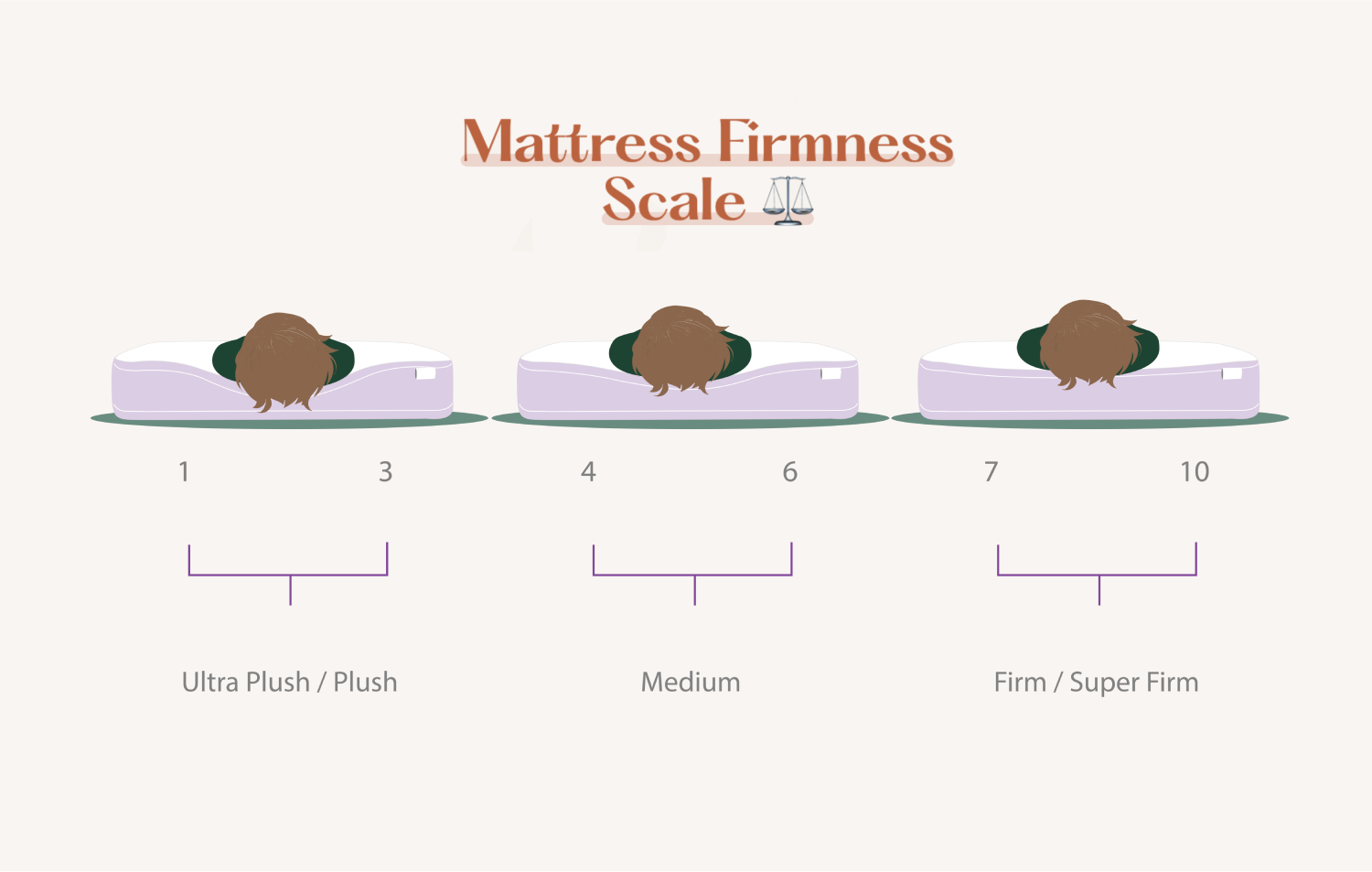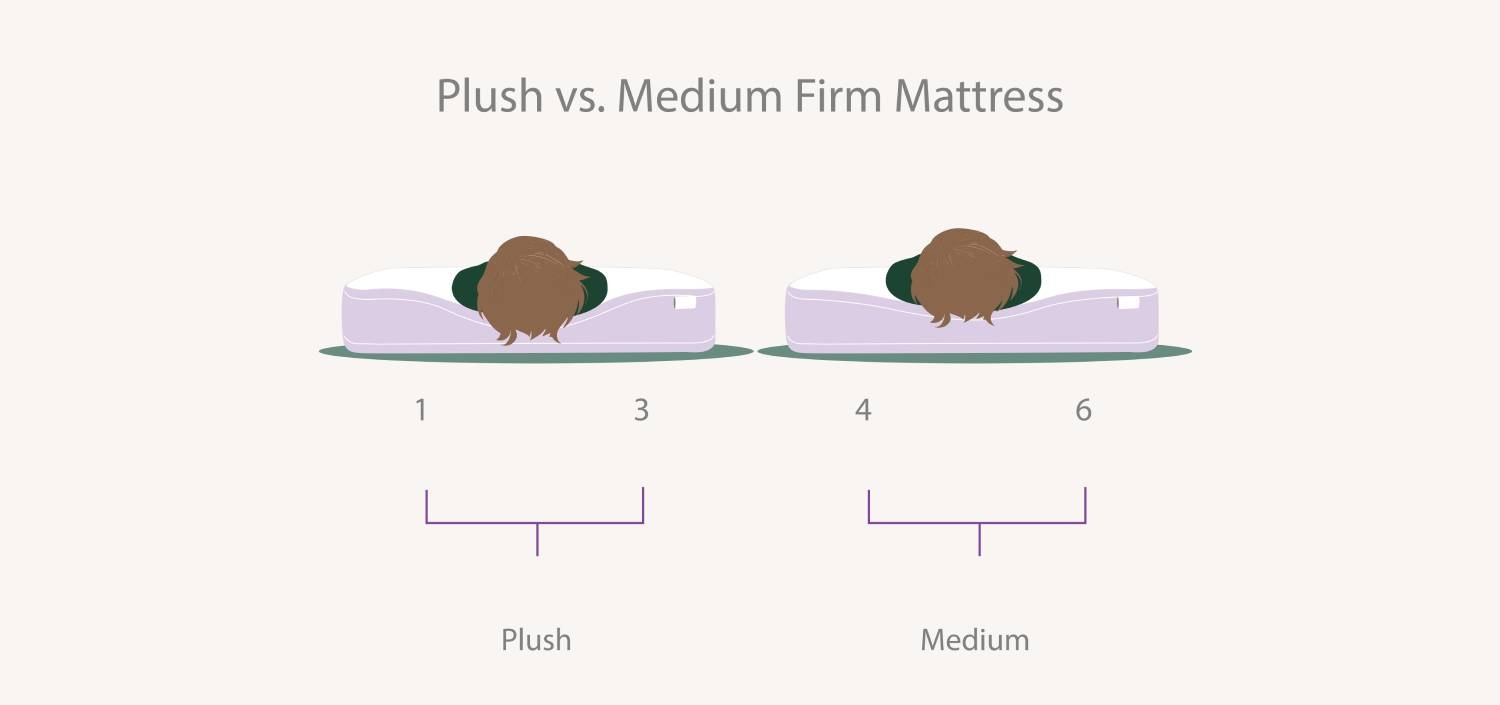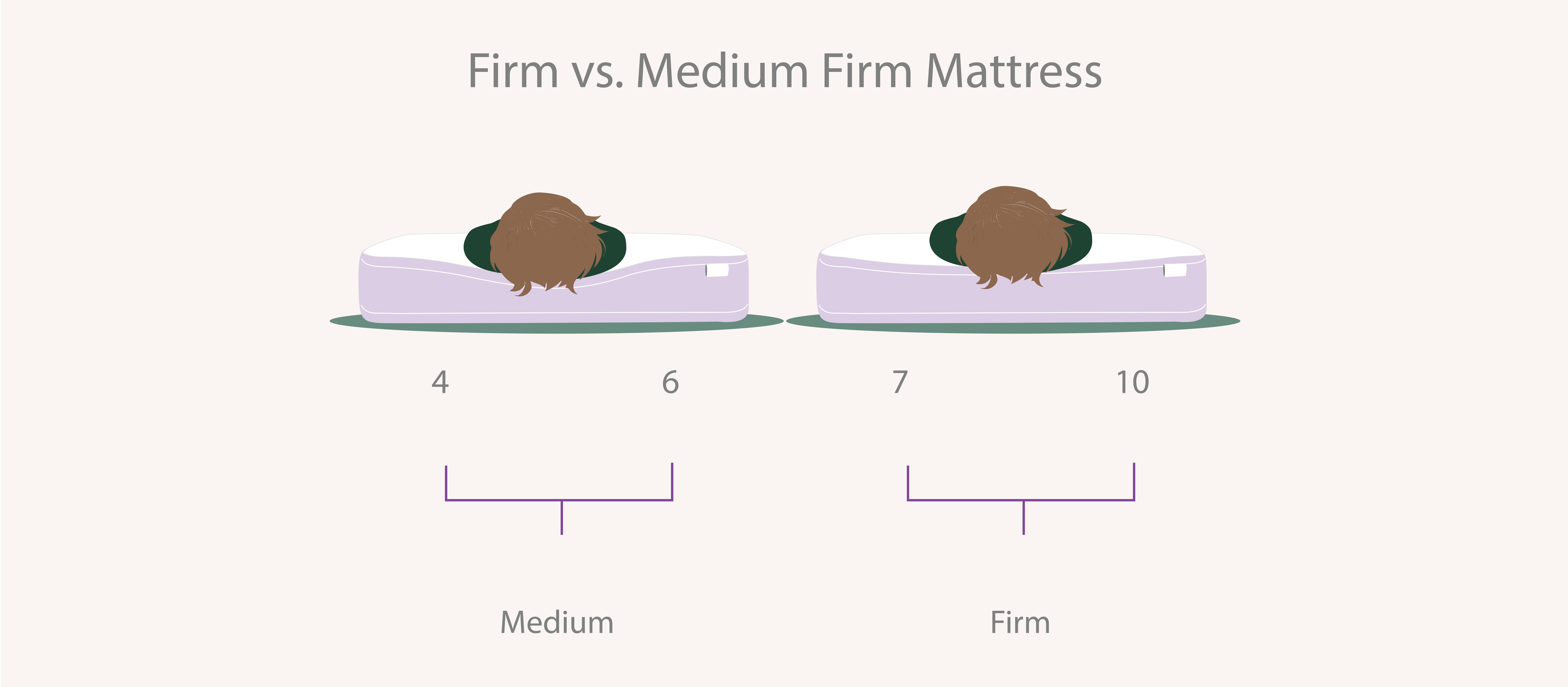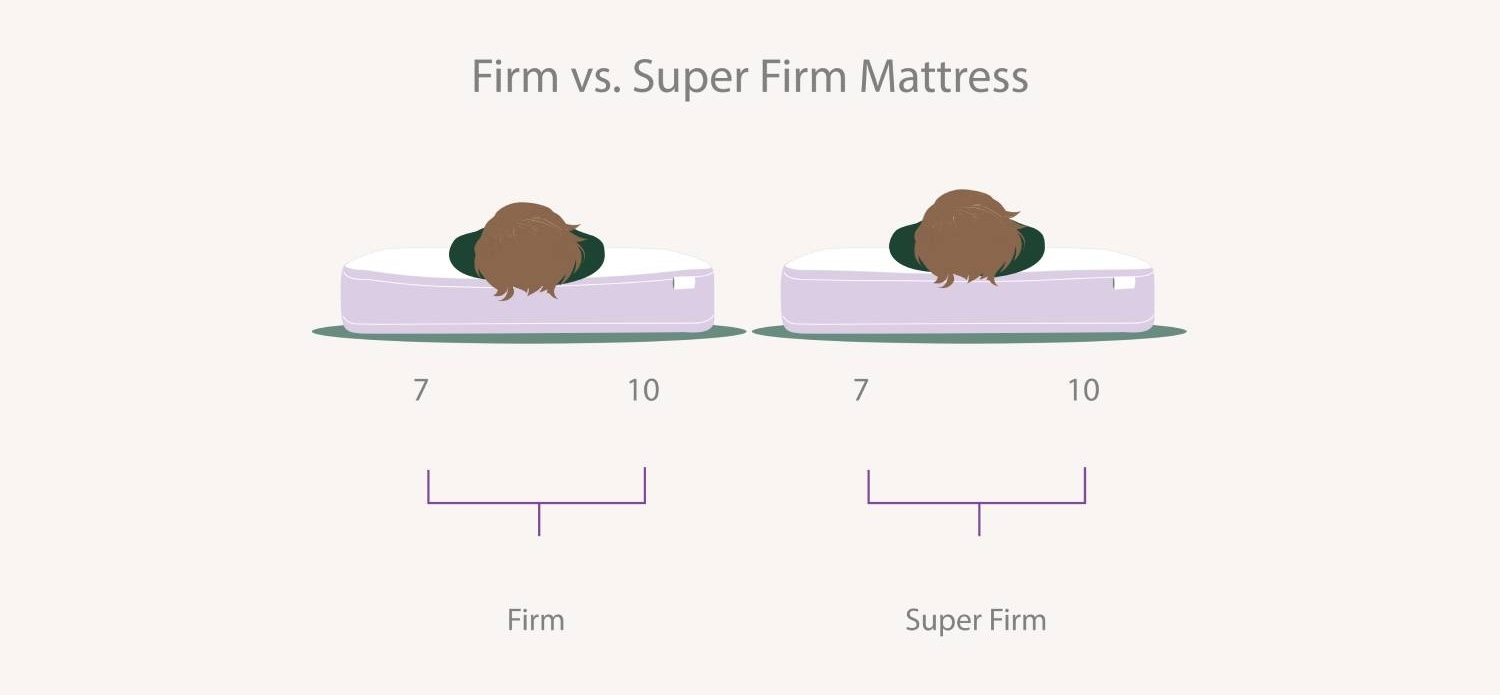
The Mattress Firmness Scale: Find the Right Fit for You
In theory, mattress shopping sounds simple. However, it can become complicated fast, with endless choices and many words thrown into the mix that may not mean much to you. Plush, medium, firm, extra firm... What's the difference, anyway?
The thing is, the firmness of a mattress matters a lot. Make the wrong choice, and your back, hips, and neck will probably let you know about it. That's where the mattress firmness scale comes in handy. It can help you make sense of all the options and find the ideal fit.
At Beds n Dreams, we've been helping people get their best sleep for decades. In this article, we explain the mattress firmness scale and how to choose mattress firmness that works perfectly for your body and the way you sleep.
What is the mattress firmness scale?
Simply put, the mattress firmness scale is a way to determine how soft or hard a mattress feels. Most brands use a scale from 1 to 10. One being super soft and squishy, and ten being pretty solid. Most people end up choosing a mattress somewhere in the middle.
You’ll also see the mattress firmness scale simplified as soft, medium, or firm. This is easier to wrap your head around, and most brands stick to those labels in-store. Either way, there's no exact science behind it. The firmness of a mattress is based on how it feels, and how it feels can be different for everyone. For example, your medium might feel firm to someone else.
With that being said, the mattress firmness scale is still a helpful starting point. It can help you narrow things down and compare mattresses when shopping around.
Mattress firmness levels explained
The mattress firmness scale helps explain what kind of feel you’re getting, so you’re not relying on vague labels like 'supportive' or 'premium comfort.' Here’s what the different mattress feels really mean:
1–3: Ultra Plush/Plush
Think plush, cushy, and lots of sink. Mattresses within this section of the firmness scale hug your body and ease pressure on your shoulders and hips. Soft mattresses are often a good match for side sleepers or anyone with a smaller frame. If you like that gentle, cradled feeling but don’t want to completely sink in, look for something 'soft to medium', i.e., a 3.
Comparing a plush vs medium mattress? Plush gives you more sink. Medium gives you more lift. It’s a feel thing, not a quality thing.

4–6: Medium
This is generally the most popular zone of the mattress firmness scale. A medium firm mattress does a great job of balancing comfort with support. It gives a bit, but not too much. This level of firmness can be a good fit for most sleeping positions, which is helpful if you move around during the night. If you like some cushioning but still want your back to feel supported, a medium soft mattress can hit that sweet spot.
Tossing up between a firm vs medium mattress? Consider a mattress at the higher end of the medium firmness level. For instance, a 6. Generally speaking, medium firmness suits most people, but it does depend on how you sleep and what feels good to your body.

7–10: Firm/Super Firm
This end of the firmness scale is all about maximum support. A firm mattress doesn’t have much give at all. It keeps your body lifted and more 'on' the bed than 'in' it. And that’s not necessarily a bad thing. For back or stomach sleepers, or anyone with a heavier build, this firmness level can help stop your hips from dipping too far and messing up your spinal alignment.
A firm bed can also be a great option for prioritising airflow. You won’t sink in as much. So, heat doesn’t get trapped around your body.
Weighing up firm vs super firm mattress options? Extra firm is seriously stiff. It has minimal cushioning and almost zero sink. For the majority of people, a regular firm is more than enough. If extra firm sounds a bit intense, it's probably because it is.

How to choose the right mattress firmness
Not sure which firmness of mattress to go for? It really comes down to how you sleep and what your body needs. Here are a few things to think about before committing to a mattress:
Side sleepers need pressure relief
If you sleep on your side, your shoulders and hips cop most of the pressure. A bed that’s too firm will jam into those points and throw out your spine. A softer mattress, or even something soft to medium, can ease the pressure while still providing you with support where you need it.
A good test? Lie on your side and slide your hand under your waist. If there’s a gap, the mattress is probably a bit too firm.
Stomach sleepers need hip support
Stomach sleeping twists your back if your hips sink too low. So, if you sleep like this, you need a mattress that keeps your hips up and your spine straight. That generally means firmer is better for you. Consider around a 6 or higher on the mattress firmness scale.
If you're struggling to choose between a firm vs medium mattress, go firm. Medium can feel nice during a 'test lie down', but you’ll likely wake up sore after a whole night's sleep if it’s not supportive enough.
Back sleepers need balance
This is the tricky one. Too soft and your hips sag. Too firm and your lower back arches off the bed. Try lying flat and sliding your hand under the small of your back. If there’s no space, it’s likely too soft. If your hand slips through too easily, it’s probably too firm. A medium firm mattress, around a 5 to 7, usually offers the best spinal alignment.
Weight changes how firmness feels
As mentioned, mattresses don’t feel the same to everyone. Your body weight can play a massive role in your perception of mattress firmness. If you’re under 60kg, for example, even a medium bed can feel firm. So, go softer to get proper pressure relief. If you're over 100kg, on the other hand, you’ll sink more. This means you’ll need something firmer to keep your spine in check. When in doubt, trust how a mattress feels for your body rather than what the tag says.
Common misconceptions about mattress firmness
Thanks to information overload paired with the amount of dodgy advice circling out there, there are some common misconceptions about mattress firmness. Here’s what trips people up most:
Firmer doesn’t mean more supportive
People assume that a firm mattress is automatically better for your back. But, it's not as simple as that. Support ultimately comes from how well a mattress keeps your spine in a straight line (not how hard it feels). In fact, too firm and you’ll create new pressure points in all the wrong places.
That’s why we always say: don’t guess. Test different mattresses, and choose based on how your body responds.
Soft doesn’t mean saggy or bad for your back
Many softer mattresses actually have strong support systems underneath their plush top layer. This means comfy cushioning up top and good structure underneath. It's a combo that can work really well for lighter sleepers or side sleepers.
Soft only becomes a problem when it doesn’t bounce back after a few months. And that's not a firmness thing, that's a quality thing.
The in-store feel doesn’t tell the full story
Lying on a mattress for two minutes in a shop isn’t the same as eight hours of sleep. Your muscles aren’t fully relaxed, and the surface might feel softer than it really is. Plus, a new mattress will feel quite different once it’s been properly broken in. That’s why trial periods are essential.
If you’re choosing based solely on a quick showroom lie-down, you’re almost flying blind. So, always check trial periods and return policies!
Need help?
At Beds n Dreams, we’ve got mattresses in every firmness category from soft to medium and firm, and everything in between! We also stock mattresses from well-known local and international brands in a range of materials, such as memory foam, hybrid, and latex. For your convenience, you can shop online from the comfort of your home. More of a hands-on shopper? Visit one of our showrooms dotted around the country!
Not sure what's right for you? That’s where our experienced team comes in. We’re here to guide you to the best fit based on how you sleep and what your body really needs.
Plus, if once you get it home you discover that it’s not quite right, we offer a 30-night mattress exchange on selected brands. That gives you time to sleep on it properly and swap it later if you need to.
Remember, good sleep starts with the right mattress. And that’s exactly what we’re here to help you find!